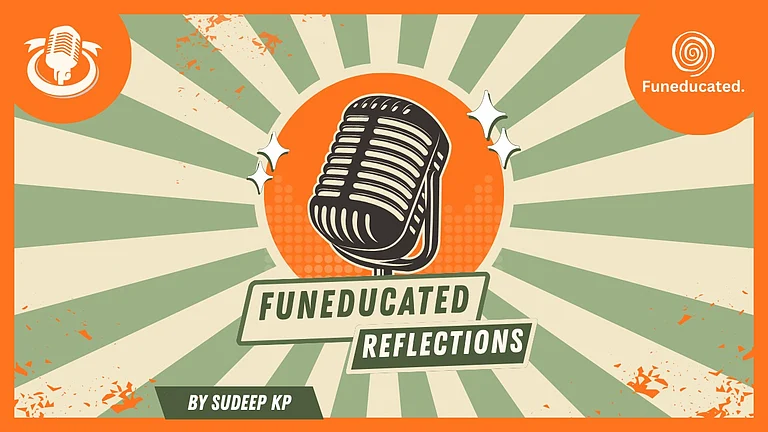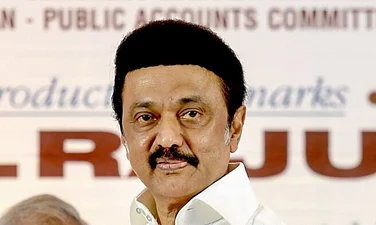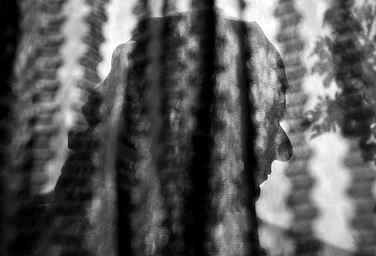RESTORING democracy through elections may on paper look like the perfect balm for strife-torn Kashmir. But the ground situation suggests the Valley may not respond to the poll slated for May in the fashion New Delhi hopes it will. No politician of import in Srinagar believes the six Lok Sabha seats in the state (three of them in the Valley) will witness free and fair polling. With the counter-insurgency drive going out of hand, these fears are not unfounded. More crucially, coming close on the heels of the March 15 meeting in New Delhi between nine ex-militants and Union Home Minister S.B. Chavan, the propaganda machinery of those opposed to the polls is construing a sinister link between the North Block parleys and the announcement of elections. This, say observers, may well jeopardise the peace initiative.
In the context of the counterinsurgency move, the militant group which was in Delhi—the Forum For Peaceful Resolution (FFR)—is being viewed with suspicion. And even going by the figures quoted by P. S. Gill, IGP, 555 civilians, 520 militants and 56 securitymen have been killed in the Valley during January and February. The popular perception is that the civilian deaths were caused by "agents of India" or "renegade militants". No wonder, then, that the FFR wants to distance itself both from the Congress and the proposed polls. Its present stand is that the elections will be no more than a farce (see box).
In fact, two FFR leaders—former Al Barq chief Bilal Lodhi and ex-Hizbul man Imran Rahi—boycotted the March 23 talks in Srinagar with the three-member committee headed by Special Secretary V.K. Jain. The committee was set up by the Union Home Ministry to follow up on the New Delhi talks.
Both Lodhi and Rahi have strongly criticised the decision to hold elections in Kashmir. The situation was salvaged somewhat when an FFR sub-committee met the Jain Committee. Jain later described the talks as headed in the right direction. He said the FFR'S demands—that the renegades be disarmed, jailed militants be freed, and the army be pulled out—were justified though the modalities of how to meet them have to be worked out. But the FFR's unequivocal opposition to polls was impressed upon the committee.
The hardened anti-election stand of the All Party Hurriyat Conference—the political forum of various militant groups in the Valley—is well known. Ever since the Election Commission announced the poll dates, this stand has been articulated by all its senior leaders and widely publicised. The polls have already been dubbed a "sham". Says Shabir Shah, former People's League chief and a Hurriyat leader: "The elections will be nothing more than a drama. It's a stunt to fool the people of India. It will fall flat on its face." Javed Mir of the JKLF, which is part of the Hurriyat, is even more vocal: "We won't let the elections happen. The people of Kashmir are with us on this."
The day the Jain Committee arrived in Jammu, March 21, Srinagar and the Valley observed a total bandh. "The response to the bandh call indicates what the people think of these peace initiatives," says Mir. Fear may have contributed to the bandh's success, but even the pro-election section points out that the Centre should have initiated goodwill measures to restore the confidence of the people before announcing the polls.
State Janata Dal chief Abdul Qayum feels Lok Sabha and assembly elections should be held simultaneously, but after the general elections. He elaborates: "Merely holding parliamentary elections will be useless. Assembly polls mean more local participation. But the climate is not right for polls. People are living under the fear of the gun. Counter-insurgency has its role...but I'm afraid things have gone out of hand. The renegades are taking the law into their hands. They are looting and raping. The people's faith in Delhi is shaken."
The counter-insurgency drive has, by all accounts, gone awry. Col K.P. Ramesh, deputy commander of the Rashtriya Rifles—a paramilitary outfit formed in 1993 heading the counter-insurgency operations—has gone on record that he has about "two dozen" militants "working for" him. He affirms that the renegades have been given "weapons for their own safety". He also admits to extortion cases and says "six such chaps have been handed over to the police".
The renegades operate in much the same way as some of the militant groups. They use the gun to extort money from shopkeepers, to settle personal scores and to indulge in unchecked looting. Towns like Anantnag and Pampore are said to be under their control. The renegades also put pressure on the press in Srinagar to report their statements. On March 11, a renegade outfit came with a vanload of AK-47 wielding men and did the rounds of newspaper offices, demanding that each paper immediately depute a reporter for a press conference at Anantnag. Every publication complied.
The renegades claim they are liberating Kashmir but obviously operate with New Delhi's blessings. The scale of the operations is reflected in the claim made by Ansarul Haq, commander of the Ikhwanul Muslimoon (one of the renegade outfits), that he has 10,000 armed activists in the Valley and 400 in Srinagar under his control. These renegades are brutal and often bring a bad name to the Army. Says Azam Inquillabi of the Mahaz-e-Azadi, who is for a peaceful and permanent solution in Kashmir: "Right now a majority of people here are with India. Earlier they were with Pakistan. By letting the renegades go wild, India is harming itself. The misdeeds of the renegades are seen as the actions of the Indian Army." Adds National Conference chief Farooq Abdullah: "No one will support this licence to some people to loot, kill and rape. It must be stopped."
A visit to Pampore, a township some 15 km outside Srinagar gave a glimpse of the renegades at work. On March 21, the town was observing its 17th day of bandh against illegal occupation by an unidentified renegade group. Houses in the town were burnt and the few people who dared to talk complained of large-scale extortion. The local police station refused this correspondent protection on the ground that they were helpless against the renegades who were seen near the BSF bunkers on the main street with their automatic rifles and driving around in private vehicles. Local elders have been holding meetings with the district authorities, pleading that the renegades be evicted.
The renegades, it is alleged, have also seized control of a section of Anantnag and, if reports coming into Srinagar are to be believed, are resorting to extortion with full protection from the Rashtriya Rifles and the BSF. Points out G.N. Hagru, senior advocate of the Srinagar Bar: "We are now caught between three guns—one from the security forces, the other from the militants and now the third one from the renegades.
" When the FFR met Chavan in Delhi, one of the confidence-building measures it had suggested was the disarming of the renegades and the removal of BSF bunkers. This has been met with adverse reactions from the renegade outfits, who only a week earlier had praised the peace efforts. Now they are strongly opposed to the FFR. Incidentally, it is the four main renegade groups who have been issuing statements in support of elections.
This has further shaken the confidence of the Kashmiris. They fear the renegades will be used to bring people to the ballot box at gun point. There is a general sense of cynicism. Perhaps the Hurriyat has lost face after the FFR started the peace process. And people may be willing to give democracy a chance. But, first, New Delhi will have to convince them that the polls will be fair and free. If not, many fear, it will be a meaningless exercise. Says Inquillabi: "In Jammu, the polls will be recreation for politicians. In the Valley, it will be adding fuel to the fire."






















